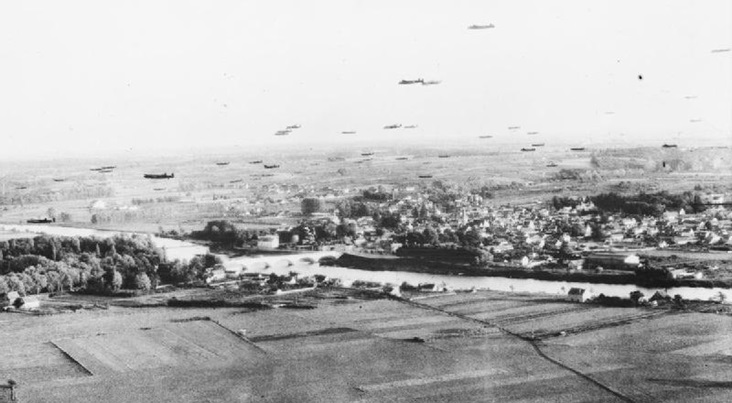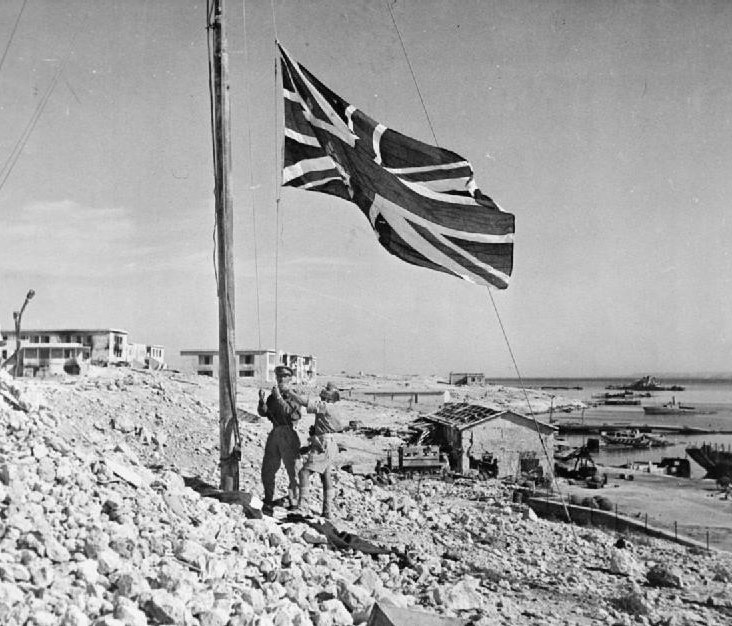I Was There! - We Knocked Out 37 Axis Tanks in Egypt
The War Illustrated, Volume 6, No. 142, Page 381, November 27, 1942.
Described by their Corps Commander as "one of the finest actions of the war", a company of 8th Army riflemen, cut off by the enemy in the Western Desert, fought on for 36 hours and with their 6-pounder guns knocked out 37 Axis tanks. The story of the engagement is told by Sergt. Charles Calliston and is reprinted here from the Daily Telegraph.
We moved up to occupy a post at night. There was a very bright moon, and as we advanced we came in for a spot of bother from some German anti-tank guns. Our post was on a small diamond-shaped ridge. The enemy started machine-gunning us and sending over mortar bombs. A thousand yards away I could see the lumpy shape of a leading German tank.
They came rumbling on, spurting at us with their machine-guns, backed by shells and mortar bombs. There were 50-odd tanks, and a staff car leading them. I let go at 150 yards. You could not miss. All our guns seemed to be firing at once. My target burst into flames, but came on another 50 yards before halting. Over on my left one blew up at 200 yards.
We were giving them hell, but we were not by any means getting away with it. Our position was rather exposed, and they let us have everything they had got. They even attacked us with lorried infantry, but the main battle was our guns against the 50 tanks. When they about-turned and returned we knew that for the moment our guns had won.
Some enemy tanks tried to hide by mixing up with the knocked-out tanks and derelict vehicles, but we were used to most of Jerry's tricks. The crew of one tank tried to repair it on the spot; we picked them off with rifles. I heard an 88-mm. gun banging away at us on the flank. Then there was silence as one of our guns scored a direct hit.
All this time the enemy never let up; nor did we stop. My gun had smashed up five tanks in the first attack, and I only count those that were burned out. Some of our guns were out of action. Some had run out of ammunition.
The thing that sticks out in my memory is our company commander saying we were cut off and there wasn't anything that could get through to us. We could fight it out, and keep on fighting as long as we had a shell or bullet or bayonet. Yes, we understood. There was no rest .When you had time to listen you realized we had fewer and fewer guns firing.
Two of my crew crept out on their bellies right into the open to get some ammunition under enemy fire. Then the platoon commander decided to reach a jeep which had four boxes of ammunition on board. God knows how he got to it – they were machine-gunning him the whole way.
They hit the jeep and it caught fire, but he kept on driving it on. We got the "ammo." off and then I had a funny idea. We had naturally been unable to light a fire, but there was a perfectly good one. So I put a can of water on the burning jeep, and it brewed up well enough for three cups of tea.
Our colonel kept going from gun to gun. How he inspired us! The enemy tried to shift us with infantry attack, but we sent them on their way with our Bren carriers.
When the next tank attack came the colonel was acting as loader on my gun. He was wounded in the head – it was a nasty wound, and we wanted to bind it up, but he would not hear of it. Keep in firing – that's what he wanted, and we did not pause. When the colonel was too weak to refuse attention we bandaged his head and put him behind some scrub.
He called out that he wanted to know what was happening, and my officer kept up a running commentary. We hit three tanks with three successive shots, and the colonel said "Good work – a hat-trick!"
Another gun got two tanks with one shell – they were one behind the other, and so the shell passed right through the nearest into the other, knocking out both. The ground in front of us was littered with broken tanks. Our officers were all working on the guns with us.
Suddenly I realized my gun had only two rounds of ammunition left. We took a line of two tanks and got both. Then came an order to make our way back to our own lines as best we could. We had to go under fire the whole way for two and a half miles.
We removed the breech-blocks and sights from our guns. We had men with tommy-guns leading us, and we carried the wounded in the centre. I had one of the wounded on my back. It took us four hours to reach our lines. Today we heard that some of our troops are back on our position. I hope they have our guns. We still have the breech-blocks, you know!
Previous and next article from I Was There!
I Was There! - On the 13th Day I Killed and Ate a Seagull
This is the story told by Pilot Officer Holbrooke Mahn, 23-years-old American member of the Royal Canadian Air Force, who spent 14 days in a small dinghy in the North Sea following the crash of his Ha
I Was There! - We Rammed Oran's Boom to Land Our Troops
To facilitate the landing of Allied assault troops at Oran the concrete boom across the harbour entrance had to be smashed and defences immobilized. The part H.M.S. Hartland played in this perilous ac
Index
Previous article
The Incomparable Air Photograph of the War!
Lancasters Carrying Destruction to Le Creusot. One Saturday afternoon in October, 94 R.A.F. Lancasters set out to bomb the Schneider armament works at Le Creusot, 170 miles south-east of Paris. In t





